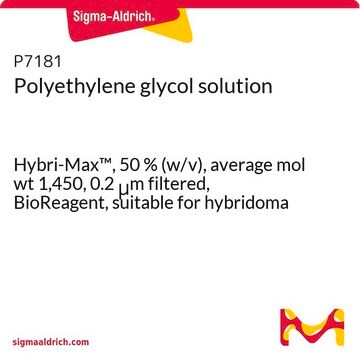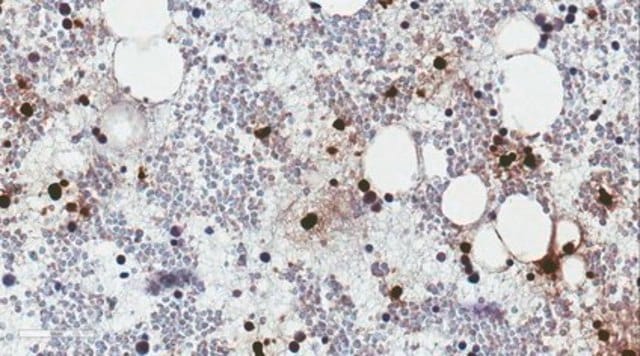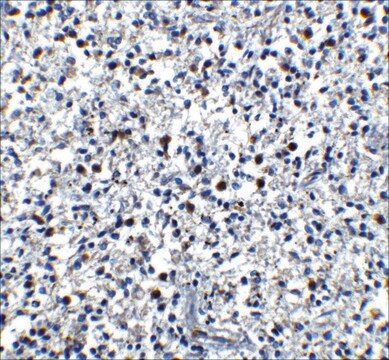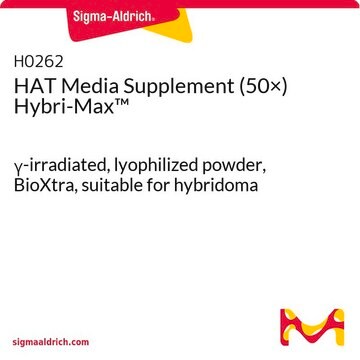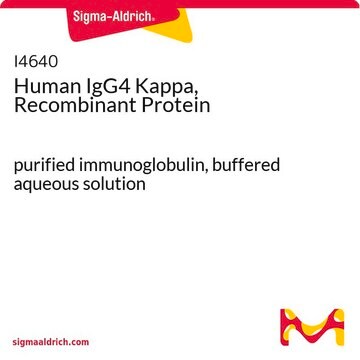MABN696
Anti-G6PD Antibody, clone 2H7
ascites fluid, clone 2H7, from mouse
Synonym(e):
Glucose-6-phosphate dehydrogenase, G6PD
About This Item
Empfohlene Produkte
Biologische Quelle
mouse
Qualitätsniveau
Antikörperform
ascites fluid
Antikörper-Produkttyp
primary antibodies
Klon
2H7, monoclonal
Speziesreaktivität
human
Methode(n)
flow cytometry: suitable
immunohistochemistry: suitable
western blot: suitable
Isotyp
IgG1
UniProt-Hinterlegungsnummer
Versandbedingung
wet ice
Posttranslationale Modifikation Target
unmodified
Angaben zum Gen
human ... G6PD(2539)
Allgemeine Beschreibung
Immunogen
Anwendung
Neurowissenschaft
Entwicklungsneurowissenschaft
ELISA (Direct) Analysis: A 1:10,000 dilution from a representative lot detected G6PD with recombinant G6PD protein antigen.
Flow Cytometry Analysis: A 1:200-400 dilution from a representative lot detected G6PD in non serum starved Jurkat cells.
Optimal working dilutions must be determined by end user.
Qualität
Western Blotting Analysis: A 1:500-2,000 dilution of this antibody detected G6PD in HeLa, MCF-7, Jurkat and K562 cell lysates.
Zielbeschreibung
Verlinkung
Physikalische Form
Lagerung und Haltbarkeit
Handling Recommendations: Upon receipt and prior to removing the cap, centrifuge the vial and gently mix the solution. Aliquot into microcentrifuge tubes and store at -20°C. Avoid repeated freeze/thaw cycles, which may damage IgG and affect product performance.
Hinweis zur Analyse
HeLa, MCF-7, Jurkat and K562 cell lysates
Haftungsausschluss
Not finding the right product?
Try our Produkt-Auswahlhilfe.
Lagerklassenschlüssel
12 - Non Combustible Liquids
WGK
nwg
Flammpunkt (°F)
Not applicable
Flammpunkt (°C)
Not applicable
Analysenzertifikate (COA)
Suchen Sie nach Analysenzertifikate (COA), indem Sie die Lot-/Chargennummer des Produkts eingeben. Lot- und Chargennummern sind auf dem Produktetikett hinter den Wörtern ‘Lot’ oder ‘Batch’ (Lot oder Charge) zu finden.
Besitzen Sie dieses Produkt bereits?
In der Dokumentenbibliothek finden Sie die Dokumentation zu den Produkten, die Sie kürzlich erworben haben.
Unser Team von Wissenschaftlern verfügt über Erfahrung in allen Forschungsbereichen einschließlich Life Science, Materialwissenschaften, chemischer Synthese, Chromatographie, Analytik und vielen mehr..
Setzen Sie sich mit dem technischen Dienst in Verbindung.
